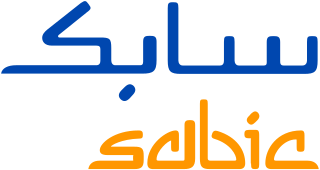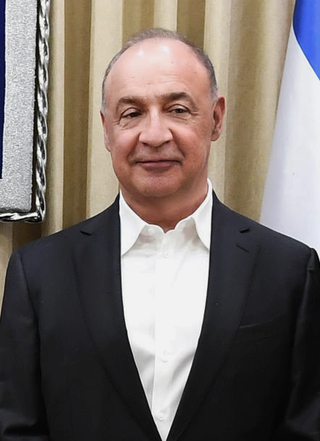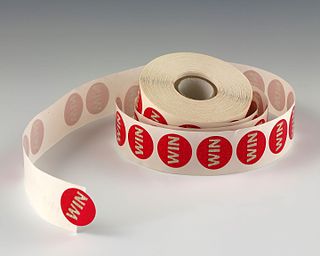Related Research Articles

BASF SE, an initialism of its original name Badische Anilin- und Sodafabrik, is a European multinational company and the largest chemical producer in the world. Its headquarters are located in Ludwigshafen, Germany.

Koninklijke DSM N.V., was a Dutch multinational corporation active in the fields of health, nutrition and materials. Headquartered in Heerlen, at the end of 2017 DSM employed 21,054 people in approximately 50 countries and posted net sales of €8.632 billion in 2018 and €9.204 billion in 2021. In May 2023 it merged with the Swiss company Firmenich to form a new entity named dsm-firmenich.

LyondellBasell Industries N.V. is an American multinational chemical company incorporated in the Netherlands with U.S. operations headquartered in Houston, Texas, and offices in London, UK. The company is the largest licensor of polyethylene and polypropylene technologies. It also produces ethylene, propylene, polyolefins, and oxyfuels.
Braskem S.A is a Brazilian petrochemical company headquartered in São Paulo. The company is the largest petrochemical company in Latin America and has become a major player in the international petrochemical market.

Saudi Basic Industries Corporation, known as SABIC, is a Saudi chemical manufacturing company. 70% of SABIC's shares are owned by Saudi Aramco. It is active in petrochemicals, chemicals, industrial polymers and fertilizers. It is the second largest public company in the Middle East and Saudi Arabia as listed in Tadawul.

Neste Oyj is an oil refining and marketing company located in Espoo, Finland. It produces, refines and markets oil products, provides engineering services, and licenses production technologies. Neste has operations in 14 countries.
A polyolefin is a type of polymer with the general formula (CH2CHR)n where R is an alkyl group. They are usually derived from a small set of simple olefins (alkenes). Dominant in a commercial sense are polyethylene and polypropylene. More specialized polyolefins include polyisobutylene and polymethylpentene. They are all colorless or white oils or solids. Many copolymers are known, such as polybutene, which derives from a mixture of different butene isomers. The name of each polyolefin indicates the olefin from which it is prepared; for example, polyethylene is derived from ethylene, and polymethylpentene is derived from 4-methyl-1-pentene. Polyolefins are not olefins themselves because the double bond of each olefin monomer is opened in order to form the polymer. Monomers having more than one double bond such as butadiene and isoprene yield polymers that contain double bonds (polybutadiene and polyisoprene) and are usually not considered polyolefins. Polyolefins are the foundations of many chemical industries.

Albemarle Corporation is an American specialty chemicals manufacturing company based in Charlotte, North Carolina. It operates 3 divisions: lithium, bromine specialties and catalysts.

Sir Leonard Valentinovich Blavatnik is a Soviet/Ukrainian-born British-American businessman and philanthropist. As of January 2024, Forbes estimated his net worth at $31.3 billion. In 2017, Blavatnik received a knighthood for services to philanthropy.

Operating as Houston Refining, LP, LyondellBasell's Houston refinery is a 268,000-barrel-per-day (42,600 m3/d) refinery located on the Texas Gulf Coast in Houston that occupies 700 acres (2.8 km2) along the Houston Ship Channel. This refinery has been in operation since 1918, and it currently produces gasoline, lubricant base stock, propylene, and other associated materials. LyondellBasell has announced its intention to close this refinery by 2023, to help it reach its climate-change goals.

Borouge is an Abu Dhabi–based petrochemicals company and a manufacturer of polyolefins. It is a joint venture of the Abu Dhabi National Oil Company and Borealis of Austria. The company was founded in 1998 and has a workforce of more than 3,100.
Access Industries, Inc. is an United States-based privately held multinational industrial group. It was founded in 1986 by businessman Leonard "Len" Blavatnik. Access Industries' focus is in seven sectors: biotechnology, entertainment, external funds, global media, strategic equity, technology ventures, and real estate. The group invests in the United States, Europe, Israel, and Latin America. It is headquartered in New York, with offices in London and Mill Valley.
Borealis AG is an Austrian plastics manufacturer. As the second largest producer of polyolefins in Europe, it is one of the market leaders in the petrochemicals industry.
A. Schulman was an American supplier of plastic compounding products, color concentrates, and additives before its acquisition by LyondellBasell in 2018.

A release liner or release paper is a paper or plastic-based film sheet used to prevent a sticky surface from prematurely adhering. It is coated on one or both sides with a release agent, which provides a release effect against any type of a sticky material such as an adhesive or a mastic. Release liners are available in different colors, with or without printing under the low surface energy coating or on the backside of the liner. Release is separation of the liner from a sticky material; liner is the carrier for the release agent.

Plastic film is a thin continuous polymeric material. Thicker plastic material is often called a "sheet". These thin plastic membranes are used to separate areas or volumes, to hold items, to act as barriers, or as printable surfaces.
SIBUR is a Russian petrochemicals company founded in 1995 and headquartered in Moscow.
Lotte Chemical Titan Holding Sdn Bhd engages in the ownership and operation of polypropylene plants, polyethylene plants, ethylene crackers, and aromatic plants. It offers high-density polyethylene (HDPE), Low-density polyethylene (LDPE), and Linear low-density polyethylene (LLDPE) for various kinds of applications, room household goods to automotives products. The company also manufactures low-density polyethylene for injection molding for cosmetic containers, bottle closures, and food containers, and is based in Pasir Gudang, Malaysia.

James L. Gallogly is a former American university administrator and retired business executive who was the 14th President of the University of Oklahoma. He has held executive positions with ConocoPhillips, ChevronPhillips and Phillips Petroleum, and is a former Chief Executive Officer of LyondellBasell. Gallogly joined the DuPont board of directors in February 2015. He became the 14th president of the University of Oklahoma, on July 1, 2018 serving for nine months and two weeks before he retired May 12, 2019.

Seetha Coleman-Kammula is an Indian chemist, environmentalist and entrepreneur. After over 25 years working in the petrochemical industry developing plastics, she began an environmental consulting firm in 2005. Her firm focuses on industrial ecology and assessment of the life cycle of products so that they are manufactured in processes that are environmentally aware of the future impact of waste products.